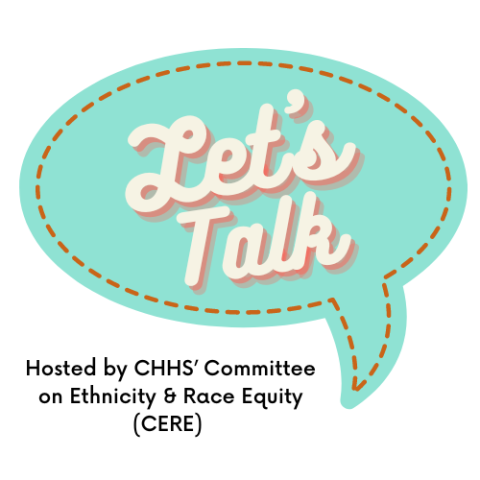The College of Health and Human Services is committed to bringing equity and inclusion into our academic teaching and research, as well as our community of students, faculty and staff who are passionate about the health and human services fields. We embrace our mission to improve lives in everything we do.
In 2019, the College established the Committee on Ethnicity and Race Equity (CERE) as a standing committee, to create a mechanism that brings us together as a community to improve how we address racial inequities and meet the challenges of creating an equitable environment for our students, faculty and staff. Through this effort, we recognize and accept the responsibility for our own self-reflection, as individuals and as a College.
We will engage the College of Health and Human Services’ faculty, staff, and students in the effort to provide an equitable and safe environment for personal, academic, and professional growth regardless of one’s ethnic or racial identification. As a predominantly White institution, we acknowledge the College’s responsibility to actively address overt and systemic racism. With a focused effort we hope to better prepare our faculty, staff, and students to serve in diverse communities within UNH, NH, and beyond. Furthermore, our collective duty is to tangibly address the culture of the College with respect to the experience of marginalized students and to appropriately respond to incidents of racism, bias, and micro-aggressions. We aim to achieve these objectives by utilizing new and existing resources within the University through critical examination and changes to:
- Training and education opportunities for CHHS staff, faculty, and students around issues of Diversity, Equity, and Inclusion (DEI)
- Procedures, practices, policies, and the culture within the college (e.g. hiring practices, creation of bias incident policies, etc.)
- Curricular changes to fill the gaps within all CHHS departments to ensure that all students graduate from UNH with a solid foundation in DEI practice.

Informal, facilitated discussions on monthly topics related to ethnicity & race equity
Open to all CHHS Faculty, Staff, & Students
3rd Wednesday of the month from 12:30-1:30pm
No RSVP Required
Reminder emails are sent to the CHHS Fac-Staff mailing list. If you do not receive them and would like to remain apprised of upcoming CERE events, contact Beth Grosso, CHHS Equity & Diversity Fellow at elizabeth.grosso@unh.edu
Erin Sharp, Associate Dean for Academic Affairs, College of Health and Human Services
Beth Grosso, Chair, CHHS Equity & Diversity Fellow, Director of Training & Professional Development, National Center for START Services, Institute on Disability
Deborah Fournier, Director of Health Law & Policy
Sophia Min, Associate Professor, Kinesiology
Sarah Leonard, Early Childhood Teacher, Child Study & Development Center
Christie Davis, Clinical Assistant Professor, Social Work
Haley Matuszek, Clinical Assistant Professor, Occupational Therapy
Jessie Bennett, Assistant Professor, Recreation Management & Policy
Kay Chen, Assistant Professor, Communication Sciences & Disorders
Sahitya Maiya, Assistant Professor, Human Development & Family Studies
Maame Bassaw, Graduate Student Rep, Social Work
Abigail Stevens ’25, Student Rep, Social Work
Semra Aytur, Professor, Health Management & Policy
Dayle Sharp, Clinical Professor, Nursing
Clarissa Michalak, Clinical Assistant Professor, Nursing
Gibran Mancus, Assistant Professor, Nursing
- Fall 2021: In an effort to develop a baseline assessment of DEI-related efforts which could be used to identify priority areas and assess progress in the years to come, CERE, in partnership with the College of Health and Human Services, launched the JEDI* (Justice, Equity, Diversity and Inclusion) Assessment. All CHHS students, faculty and staff were encouraged to participate in the anonymous assessment.
- The College used the New England Resource Center for Higher Education (NERCHE) DEI self-assessment tool, that addresses the dimensions specific to university settings for faculty, staff and students. Click here for more information about the NERCHE rubric.
- Spring 2022: CERE & CHHS hosted CHHS webinars to review preliminary outcomes, key takeaways, and action steps.
Justice, Equity, Diversity, & Inclusion Assessment Outcomes At-A-Glance
These takeaways and action steps remain at the forefront of CERE’s current efforts.
|
Key Takeaways |
Action Steps |
|
• Coordinated efforts for information dissemination regarding DEI efforts across college. • Inter-disciplinary efforts to infuse DEI related knowledge & information across curriculum. (ex: social determinants of health, intersectionality, etc.) • Strategizing student involvement beyond committee work • Critical look at the practices & policies, especially hiring & retention, is needed. |
*A note on the term ‘JEDI’: Maya Angelou’s famous sentiment, “do the best you can until you know better. Then when you know better, do better” is a guiding value when working in the justice, equity, inclusion, diversity, and belonging space.
One such example of this value in action relates to the term JEDI, used to represent Justice-Equity-Diversity-Inclusion initiatives, including our 2021 assessment. We have since learned that this acronym has problematic implications and thus are making an intentional choice to retire its use.
You can read more in this article from Scientific American.
Wildcats UNITE Against Racism is a visual campaign to promote anti-racism efforts at CHHS and on the UNH campus.
Understand your biases
Normalize talking about race and speaking up
Include everyone in all aspects of learning
Thank those who seek to help you on your journey
Everyone at UNH plays a part
- UNH Advance
- Affirmative Action and Equity Office
- Campus Climate Survey
- Community, Equity and Diversity Office
- Connect STEM
- Indigenous New Hampshire
- Multicultural Student Organizations
- Office of International Students & Scholars
- The Beauregard Center for Equity, Justice and Freedom
- Postdoctoral Diversity and Innovation Scholars
- Report it! At UNH
- UNH Resources Database
- UNH Safe Zones
- Student Accessibility Services
- UNH Training Opportunities
UNH Diversity Statement
The University of New Hampshire is committed to building and nurturing an environment of inclusive excellence where all students, faculty and staff can thrive. We also are committed to providing open and inclusive access for all alumni, volunteers, learners, employees and visitors seeking to participate in our programs and activities. We venture to sustain a campus environment that fosters mutual respect and understanding. We believe diversity, equity, accessibility and inclusion are foundational values inextricably linked to achieving our core educational mission and embrace the many characteristics of our community members that make them uniquely themselves. Here, you belong and all are welcome.
UNH Land, Water and Life Acknowledgement
As we all journey on the trail of life, we wish to acknowledge the spiritual and physical connection the Pennacook, Abenaki and Wabanaki Peoples have maintained to N’dakinna (homeland) and the aki (land), nebi (water), olakwika (flora) and awaasak (fauna) that the University of New Hampshire community is honored to steward today. We also acknowledge the hardships they continue to endure after the loss of unceded homelands and champion the university’s responsibility to foster relationships and opportunities that strengthen the well-being of the Indigenous People who carry forward the traditions of their ancestors.

